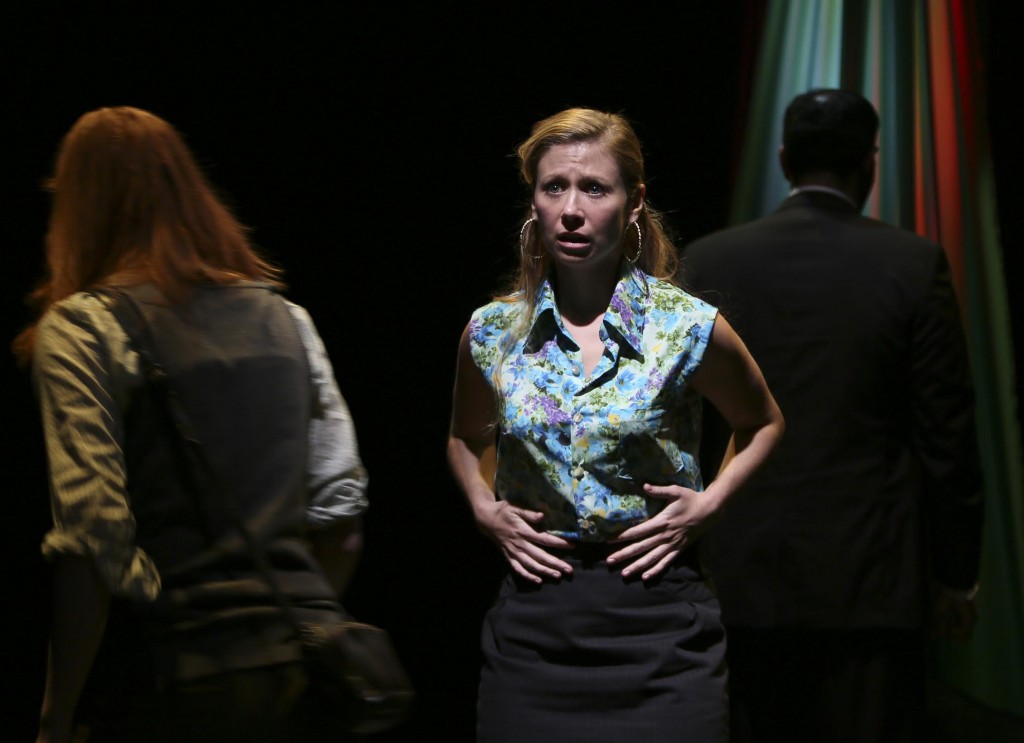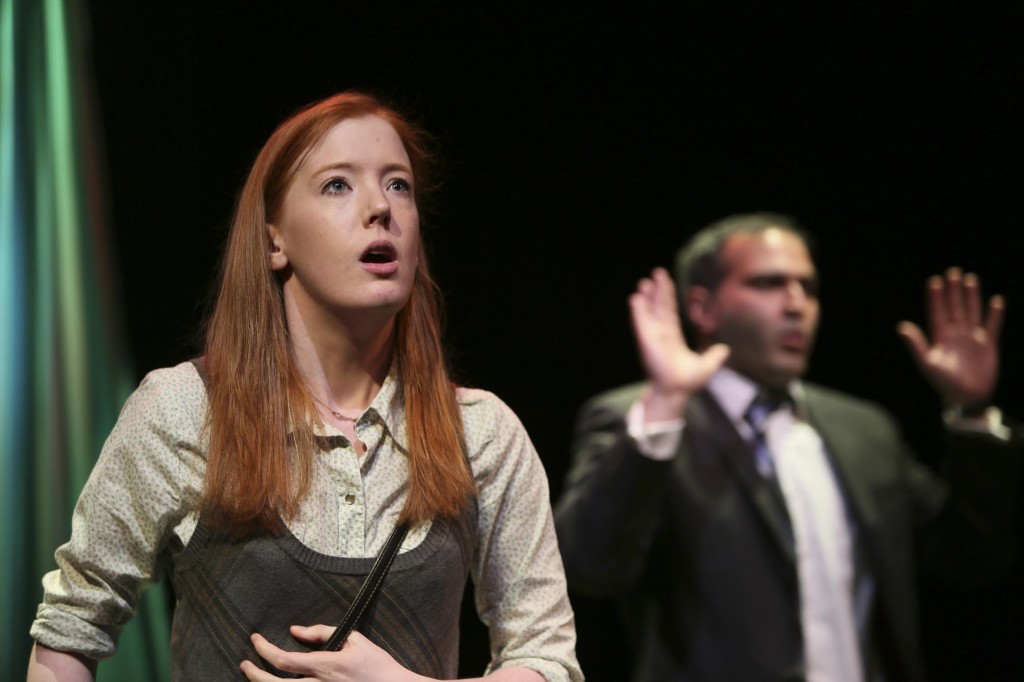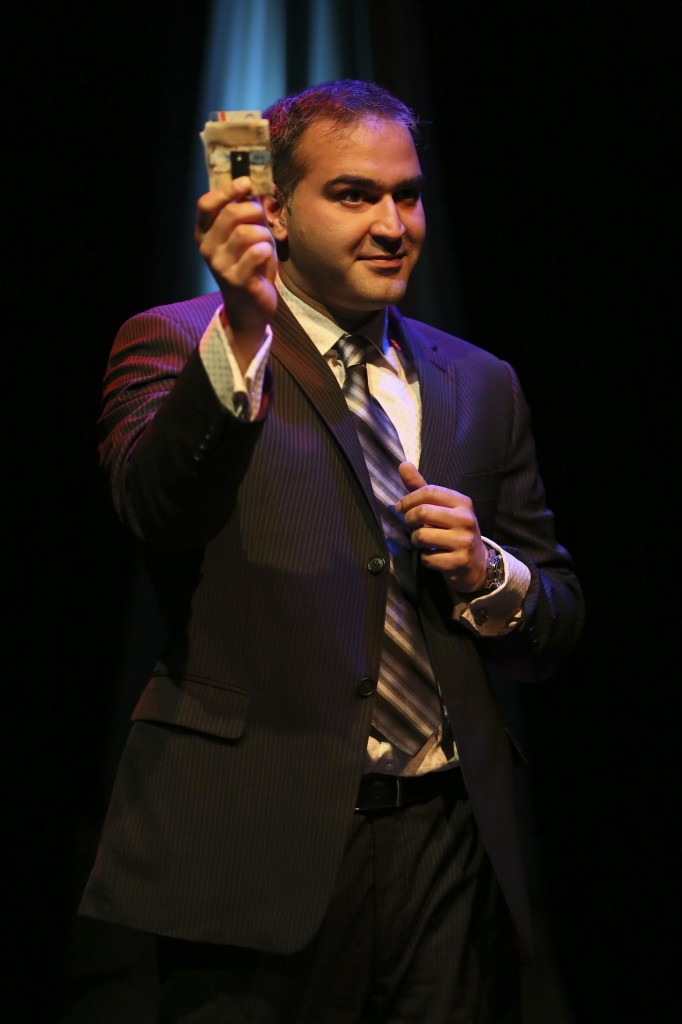
Credit: Tim Matheson
At Presentation House until March 29, 2015
604-990-3474/phtheatre.org
Posted March 21, 2015
Bad things often happen to bad people. But bad things also happen to good people. And sometimes it’s just a matter of unwise choices or unforeseen escalation: a molehill that grows into a mountain. And then, like a volcano, erupts, burning everyone in its path.
In Nicolas Billon’s scorching play, superbly directed by Kathleen Duborg for Dirt Road Productions, three seemingly unconnected characters weave a riveting tale of sex, fear, greed and religiosity. At least two of the three characters are decent people; all three make at least one disastrous error in judgment.
Estonian immigrant Kassandra (Lindsey Angell) is pursuing her graduate degree at UBC but works as an ‘escort’ (high-end hooker) in order to send money home to pay off her brother’s gambling debts. Halim (Munish Sharma) is a real estate agent getting rich by flipping apartments one of which was the former home of Anna (Georgia Beaty), the unfortunate offspring of religious zealots; she carries a bar of soap to chew on when, inadvertently, she ‘blasphemes’. Halim bought Anna’s apartment, evicted her, spruced the apartment up and has the place back on the market within a couple of months. He stands to make $50,000 on the resale.
Kassandra needs money and wants a good future in Canada; Halim wants money and sex; Anna wants an apology and her apartment back.

Credit: Tim Matheson
Three long monologues take place in that apartment and are addressed directly to the audience. Amazingly, Iceland never feels static despite very little interaction between the characters. It’s three powerful performances and the playwright’s clever knitting together of strands that make Iceland so compelling.
All three characters remain throughout on Chris McGregor’s spare set: a sofa, two chairs and an illuminated ‘glacier-like’ installation upstage. Lighting designer John Webber keeps two of the three characters in shadow as, one after the other, the actors step into the light to tell their tale. There are times when Iceland begins to feel like a simple whodunit – and, in a way, it is. But it’s so much more: how did these three people end up together in one place at one time.
Angell’s performance is so raw and Kassandra’s story so sad, it’s tempting to look away. Tugging at her short skirt and speaking in heavily Estonian-accented English, Angell commands our sympathy: Kassandra is a good person who, through her desire to help her brother, finds herself embroiled in something sordid.
Anna is less sympathetic than Kassandra but Beaty tells the story of Anna’s relationship to her mother so simply but so woefully, that we understand Anna’s motivation completely.
Halim is the character you love to hate. He’s crass and crude. Everything is for sale and if you have money, you can have it. The trouble with a wallet, he says, is that people can’t see your money so he carries a money clip in his breast pocket and flashes it whenever he needs to. He’s sexist and a free market wheeler-dealer. He wrote the book on dog-eat-dog and his reference to Iceland relates back to its disastrous bank failure. A nation of suckers, he would say, who don’t know the difference between “fish nets” and “net worth.” Actor Sharma must feel the waves of hostility coming off an audience although the playwright gives him the only funny – but off-colour – lines in the play. Warning: it would take a case of soap to clean Halim’s mouth out.

Credit: Tim Matheson
What is so fascinating about Iceland is how three characters, three stories come together and how good or simple intentions can go so badly. And here’s where Billon suggests our complicity comes into play: how easy it is to make assumptions without knowing the backstory. And how easy it is for simple disagreements to escalate and end up with a body on a slab and the story on the front page.

